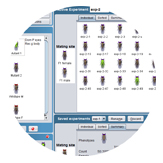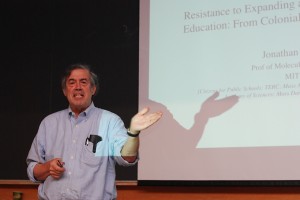 Professor Jonathan King
Professor Jonathan King
Title: Resistance to Expanding and Enhancing STEM Education: from Colonial Times to the Present
Seminar Date & Time: Monday, May 14, 2012 @ 2:00 pm
View the slides from the Professor King’s Seminar.
Professor Jonathan King is a Professor in the Biology Department at MIT. His research laboratory focuses on the genetic control of protein folding and virus assembly. In addition to his research interests, Professor King has been a long-time advocate for public understanding of science and he has been intimately involved in science curriculum and development initiatives for both K-12 and undergraduate education throughout his academic career.
During his seminar, entitled “Resistance to Expanding and Enhancing STEM Education: from Colonial Times to the Present,” Prof. King gave a rousing summary of the history of education in the United States. Starting in the colonial times, Prof. King detailed the extremely limited education opportunities for the majority of people. Schooling opportunities were limited to Sunday school and education opportunities designed to educate a fairly restricted pool of future professionals, such as doctors and lawyers. While the United States’ Founding Fathers were proponents of education for everyone, this belief system was not incorporated in the Constitution of the United States.

The widespread use of child labor during the Industrial Period provided a reason to support education for all.
With industrialization and the accompanying move from the farms to the factories, the dramatic increase in demand for workers led to the use of child labor in factories. To counteract the utilization of a child labor force, public education was proposed as the solution to get children out of the factories. This movement turned into a broader initiative to provide everyone with the opportunity to obtain an education and a means to socioeconomic advancement.
In the 1830′s, Massachusetts state paved the way to institute public education for all. In fact, the first public high school in the nation was in Massachusetts. However, during the mid-1800’s, education was still not widely accessible and was prohibited for slaves and working classes. Under the Morrill Act in 1862, states were each to establish at least one public university to meet the demands of higher education; amazingly, within 8 years, 37 states had opened public universities. Prof. King described how, in contrast to other higher education institutions, these new universities were designed to educate the public, not only offering an education in classical studies, but also in fields such as agriculture and engineering. Enrollment in higher education increased in the years following, but remained low with only 2% of the population having a college degree prior to World War II.
Upon the start of World War II, the United States realized its dire lack of trained individuals to solve the wide range of scientific and technological problems brought about by the war. With this impetus in mind, the Office of Scientific Research and Development (OSRD) was instituted. Under the OSRD, cooperative research projects, as well as federal financial support, began. This remarkable movement set the stage for the research grant system that we use today. Following WWII, the United States met another problem in that over 3 million veterans, who lacked the training and skills needed to integrate into jobs, came home. As a result, Congress passed the G.I. Bill to provide an education to more than 2 million veterans and allow them to become skilled workers within the work force. Universities and colleges expanded to incorporate the plethora of new students, and the resulting increase in college-educated people led to a technology boom that lasted for the next couple of decades. In 1957, the USSR’s launch of Sputnik, the first satellite to orbit the earth, caused the United States to scramble to keep up in science and technology and paved the way for the National Defense Education Act. The National Defense Education Act followed on the heels of the G.I. Bill and further enhanced STEM education by providing money for loans for students to attend college, fellowships to encourage the development of science teachers, and the teaching of modern foreign languages, amongst other initiatives.
The unifying principle of these initiatives produced a means to educate the masses in the United States and the United States rose to the status of being a leader in science and technology. During the mid-1900′s, research-minded institutions, such as NASA and NSF, were initiated. Additionally, civil and women’s rights movements made education open to everyone.
Professor King pointed out that in recent decades, education policies initiated under Presidents Reagan and Bush have contradicted the beliefs of the founding fathers. The “No Child Left Behind” policy, strict standardized testing, and severe reductions in public school funding have had a profound effect on STEM education and led to the education of students with diminished skills in science and technology. Professor King asked the audience to continue to fight the battle to enhance STEM education by encouraging policies to allow the teaching of evolution, decrease cuts in public school funding, and discourage privatization of public schools to strive for the best possible education for our children and produce the next generation of scientists and researchers.
Prof King has a long history of involvement in science education. Professor King is involved in many education initiatives, many of which he did not talk about during his seminar. At MIT he taught undergraduate laboratory core courses, and developed one of the first courses on “The Protein Folding Problem”. He directs the Science of the Eye Program and Darwin Society Project, which provide professional development for high school science teachers. Prof. King is a Director of the Massachusetts Association of Biology Teachers, TERC (Technology Education Research Center) and the Massachusetts Academy of Sciences. He is an officer of Citizens for Public Schools, and serves on the Science Advisory Board of the University of Massachusetts at Amherst. Prof. King is a Past President of the Biophysical Society, past Councilor of the American Society for Microbiology and of the American Society for Virology. He is a recipient of a Guggenheim Fellowship, NIH MERIT Award, and MIT’s MLK Jr. Faculty Leadership Award.




